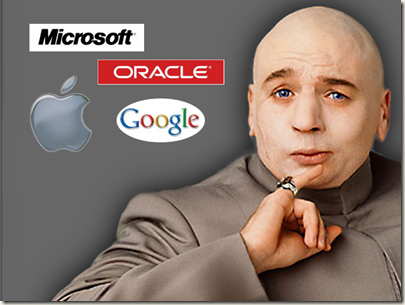UK rules that open standards must be royalty free
This is a positive development in the realm of intellectual property. Lately, large tech companies like Microsoft, Oracle, Google, and Apple have pushed standards bodies to adopt their technology as standards. Such actions are blatantly contrary to the spirit of standards.
 Now, in the UK, an open standard is defined as royalty free. Basically, this is tremendous benefit to the UK taxpayer because it means the government will be able to use open standards and not have to pay a royalty to do so. The Internet is built on “open standards”. Things like DNS, TCP/IP, and HTML are all examples of a “standard”. Without such standards, the Internet wouldn’t be able to function. They define the rules for how disparate systems will communicate to each other and to users.
Now, in the UK, an open standard is defined as royalty free. Basically, this is tremendous benefit to the UK taxpayer because it means the government will be able to use open standards and not have to pay a royalty to do so. The Internet is built on “open standards”. Things like DNS, TCP/IP, and HTML are all examples of a “standard”. Without such standards, the Internet wouldn’t be able to function. They define the rules for how disparate systems will communicate to each other and to users.
Such standards are defined and managed by what are called standards bodies. You can think of them as a committee of propropellar heads who all debate the merits of changes to an existing standard or the creation of a new one. In the past, this we done in the spirit of usability, openness, and cooperation.
a new one. In the past, this we done in the spirit of usability, openness, and cooperation.
Today, though, the process has been polluted much in the way Washington is. “Special Interests” in the form of major corporations lobby and use just about dirty trick in the book to influence a standard. Why would they do this? Because if they can get the standards body to approve a technology that depends on, requires, or is outright a technology that is own wholly by a company, they can charge all their competitors a royalty to use it.
Sound unfair? It’s not fair; but it happens all the time. Such activities where recently at the center of hotly debated controversies revolving around an international effort to define a standard document format. The goal was to create a file format that would be considered the “standard”. By defining the standard, software users would have an easy way to exchange documents without having to worry about layout, display, printing, etc. Sounds great, doesn’t it? You’d never have to ask someone what version of word they were using, or be concerned about mailing a document to someone and them not being able to open it. What a great goal!
The reality, however, is different. Large companies got in to a huge fight trying to get their format defined as the standard. Microsoft successfully got their technology defined as the standard. Who cares? You should. Because if one company can influence a standard to their direct financial benefit, it stifles competition and isn’t really a standard at all. Instead, it’s a way for a company to own and charge for an activity that every user on the Internet participates in.
 This UK ruling prevents that. Every country should adopt a similar law. Standards should win on the their technical merit and benefit to the online community. They should not be yet another way for large companies to force people everywhere to bend to their will.
This UK ruling prevents that. Every country should adopt a similar law. Standards should win on the their technical merit and benefit to the online community. They should not be yet another way for large companies to force people everywhere to bend to their will.
To be clear, I’m not against large companies submitting technology as a standard. This is a good thing! When they are submitting it as a standard, the company should forfeit the rights and the ability to charge for the technology’s use.